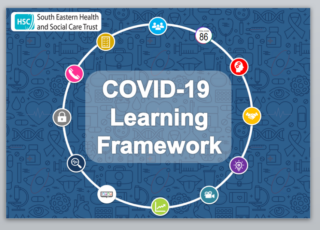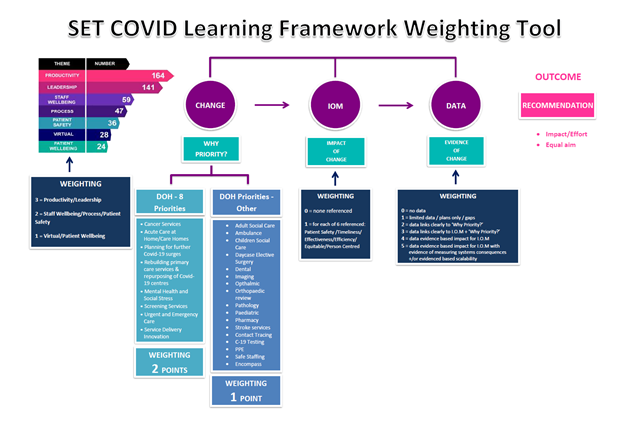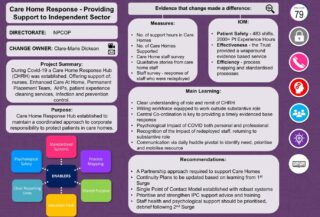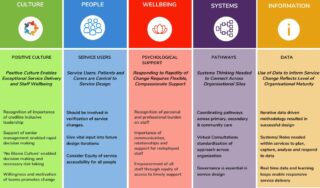
In response to the first surge of COVID-19, the Executive Management Team of South Eastern Health and Social Care Trust (SEHSCT) in Northern Ireland commissioned the development of an organisational learning system. The system was developed in order to understand the changes that had been made to services and learn from lessons that could then be applied to the second surge of the pandemic.
To begin this process, a 90-day harvesting methodology was adopted involving three phases: capturing the changes, exploring the projects and recommending innovations to be supported and embedded in the trust.
Phase One – assessing changes made
Phase one was a broad sweep across the Trust to collate the changes made.
The system survey focused on the changes made during the first wave of the pandemic and the reported impact these made. Over 280 submissions were made across all directorates in the trust. Changes submitted varied from free catering services, prison healthcare remote triage, new social worker’s virtual induction, palliative care referral pathways and theatre utilisation. This was a testimony to the ingenuity of teams facing the pandemic. The submissions were stratified into changes specifically related to COVID-19 and those that could be applied beyond the pandemic. An inductive thematic analysis was conducted on all the submissions and data weighting applied.
Phase Two – sorting through submissions
In phase two, SEHSCT directors using the Learning Framework weighting, focused the submissions down to 23 change initiatives for further exploration. A deeper dive methodology was conducted by 17 quality improvement learning leads in the Trust. This involved interviews with change owners, teams, service user feedback and service data. This information was triangulated with trust surveys and 10000 more voices staff stories.
The challenge of the trust-wide response was to structure these submissions in a meaningful way for the Framework output. Methodology was developed to assess the impact of submissions to the framework. We incorporated a thematic analysis with data impact measured against the Institute of Medicine’s six domains of quality. It was our aim to introduce an objective evaluation of the changes made and verification beyond impact self-reporting. The six domains enabled a comprehensive exploration of issues of safety, productivity and equity. As an organisation it also highlighted the need to develop a more mature system for data to be integrated in service design. The final scoring of the framework was against the innovation’s purpose, systems thinking and evidence of scalability. This methodology has enabled a robust exploration of the changes made across the organisation, amplified key lessons to be disseminated and embedded into trust culture, structure and practice.

Alongside the 23 change projects focused in the deeper dive, learning was gained by understanding Trust-wide responses. This included ICT innovations, Infection Protection Control and COVID-19 testing processes, and hospital outpatient changes.
The challenge was to distil the depth of information and knowledge from the harvesting exercise into something tangible and accessible, without losing meaning. With this aim, we developed an interactive report using Page Tiger as a platform.
Each of the 23 projects has their own page. The change owner has a video to describe the innovation, and the impact of change was assessed through the weighting formula. The project measures and the established impact on the six domains of quality is reported in the boxes and relevant data is then displayed in a pop-up. The main learning and recommendations are highlighted on each page, these are not only specific to the projects but can also be applied across the organisation and beyond.
Alongside the main learning, each slide has thematic sections which are symbolised by the icons. We were interested in what facilitates successful change, highlighting the enablers and barriers to change, communication, staff requirements, and PPI and the decision making process.

The key learning has been highlighted in five domains in the image above. It highlighted the importance of positive culture and leadership in the organisation for creating the conditions for change. While it also challenges service design focus at a systems level, that require co-ordinating pathways between different settings. Informatics and data analysis were presented as key to successful innovation. In addition, there is a great need to reflect on the equity of service delivery, which include service user verification and co-design of change.
Finally, this report is a celebration of the depth of creativity, adaptability and commitment demonstrated by the staff of the SEHSCT. Their response has been remarkable, and learning has highlighted the importance of ongoing recognition and psychological support for teams across the organisation.
Phrase Three – analysis and recommendations
Key Learning Domains
This report is one of the outputs of the analysis and recommendation phase:
- COVID-19 Framework Report
- COVID-19 Repository – A central repository of the 289 changes made across the trust, with shared learning. This also helps with planning more effectively in this current time of pandemic.
- SEHSCT Organisational Learning Report – A formal report focusing on the thematic learning in relation to the structural response to COVID-19.
The challenge is now about how we can embed the key learning into organisational practice during the current pressure on health and social care services. Meetings with senior management teams and workshops across the trust are currently being conducted to enable ownership, adaptation and implementation of the lessons. Evaluation of this new methodology and approach to health organisational change assessment is being undertaken by the Quality Improvement team at SEHSCT. The COVID-19 framework is the first iteration for the trust towards establishing an organisational learning system.
The SEHSCT COVID-19 Learning Framework Report is available to be accessed and we would love to receive feedback and discuss the methodology and transferability of the framework.
To learn more about this work, contact Ruth Gray (Clinical Lead in Prison Dentistry and Quality Improvement at SEHSCT) and Jocelyn Harpur (Senior Improvement Advisor at SEHCT)
